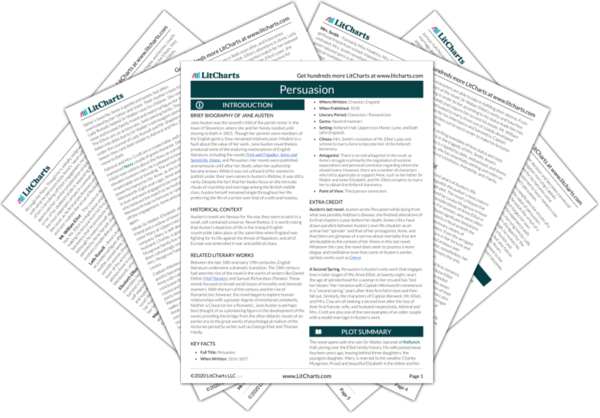The novel begins and returns repeatedly to the question of whether it is wise to be influenced by the concerns and counsel of others, or to remain fixed in one’s convictions and impulses. Anne Elliot reveals her disposition for the former when she dissolves her relationship with Captain Wentworth on the advice of her good friend and mentor Lady Russell. Seven years later, Anne experiences unrelenting regret over her decision and becomes convinced that she would have been happier marrying Captain Wentworth as his predictions for his fortunes come true—suggesting that she has learned to favor romance over her initial prudence at her friend’s persuasion.
However, the narrative ultimately complicates the virtues of a headstrong conviction in favor of the value of persuasion. When Captain Wentworth returns, he extols the virtue of a woman who will not listen to others but forges her own way—alluding with some bitterness to his experience with Anne’s willingness to be persuaded from marrying him by Lady Russell. After observing Louisa Musgrove’s disregard for the advice of others lead to great distress, though, he revises his opinion: such heedlessness reflects not only a foolish and arrogant inattention to the wisdom of others, but also fails to prove any true steadfastness in love. Ultimately, Anne’s receptivity to others comes to seem as a complement to her persevering love for Captain Wentworth, who in turn becomes persuaded of Anne’s merit.
Persuasion ThemeTracker

Persuasion Quotes in Persuasion
Anne Elliot, with all her claims of birth, beauty, and mind, to throw herself away at nineteen; involve herself at nineteen in an engagement with a young man, who had nothing but himself to recommend him, and no hopes of attaining affluence, but in the chances of a most uncertain profession, and no connexions to secure even his farther rise in that profession; would be, indeed, a throwing away, which [Lady Russell] grieved to think of! . . . It must not be, if by any fair interference of friendship, any representations from one who had almost a mother’s love, and mother’s rights, it would be prevented.
More than seven years were gone since this little history of sorrowful interest had reached its close, and time had softened down much, perhaps nearly all of peculiar attachment to him,--but she had been too dependent on time alone; no aid had been given in change of place . . . or in any novelty or enlargement of society.
Anne, at seven and twenty, thought very differently from what she had been made to think at nineteen.—She did not blame Lady Russell, she did not blame herself for having been guided by her; but she felt that were any young person, in similar circumstances, to apply to her for counsel, they would never receive any of such certain immediate wretchedness, such uncertain future good. . . . She had been forced into prudence in her youth, she learned romance as she grew older—the natural sequel of an unnatural beginning.
Captain Wentworth had not forgiven Anne Elliot. She had used him ill; deserted and disappointed him; and worse, she had shewn a feebleness of character in doing so, which his own decided, confident temper could not endure. She had given him up to oblige others. It had been the effect of over-persuasion. It had been weakness and timidity.
It is the worst evil of too yielding and indecisive a character, that no influence over it can be depended on. . . . Let those who would be happy be firm.—Here is a nut. To exemplify,—a beautiful glossy nut, which blessed with original strength, has outlived all the storms of autumn. Not a puncture, not a weak spot any where.
It was evident that the gentleman admired her exceedingly. Captain Wentworth looked round at her instantly in a way which shewed his noticing of it. He gave her a momentary glance,—a glance of brightness, which seemed to say, “That man is struck with you,—and even I, at this moment, see something like Anne Elliot again.”
Anne wondered whether it ever occurred to him now, to question the justness of his own previous opinion as the universal felicity and advantage of firmness of character; and whether it might not strike him, that, like all other qualities of the mind, it should have its proportions and limits. She thought it could scarcely escape him to feel, that a persuadable temper might sometimes be as much in favour of happiness, as a very resolute character.
If I was wrong in yielding to persuasion once, remember that it was persuasion exerted on the side of safety, not of risk. When I yielded, I thought it was to duty; but no duty could be called in aid here. In marrying a man indifferent to me, all risk would have been incurred, and all duty violated.
I was right in submitting to her, and that if I had done otherwise, I should have suffered more in continuing the engagement than I did even in giving it up, because I should have suffered in my conscience. I have now, as far as such a sentiment is allowable in human nature, nothing to reproach myself with; and if I mistake not, a strong sense of duty is no bad part of a woman’s portion.
















